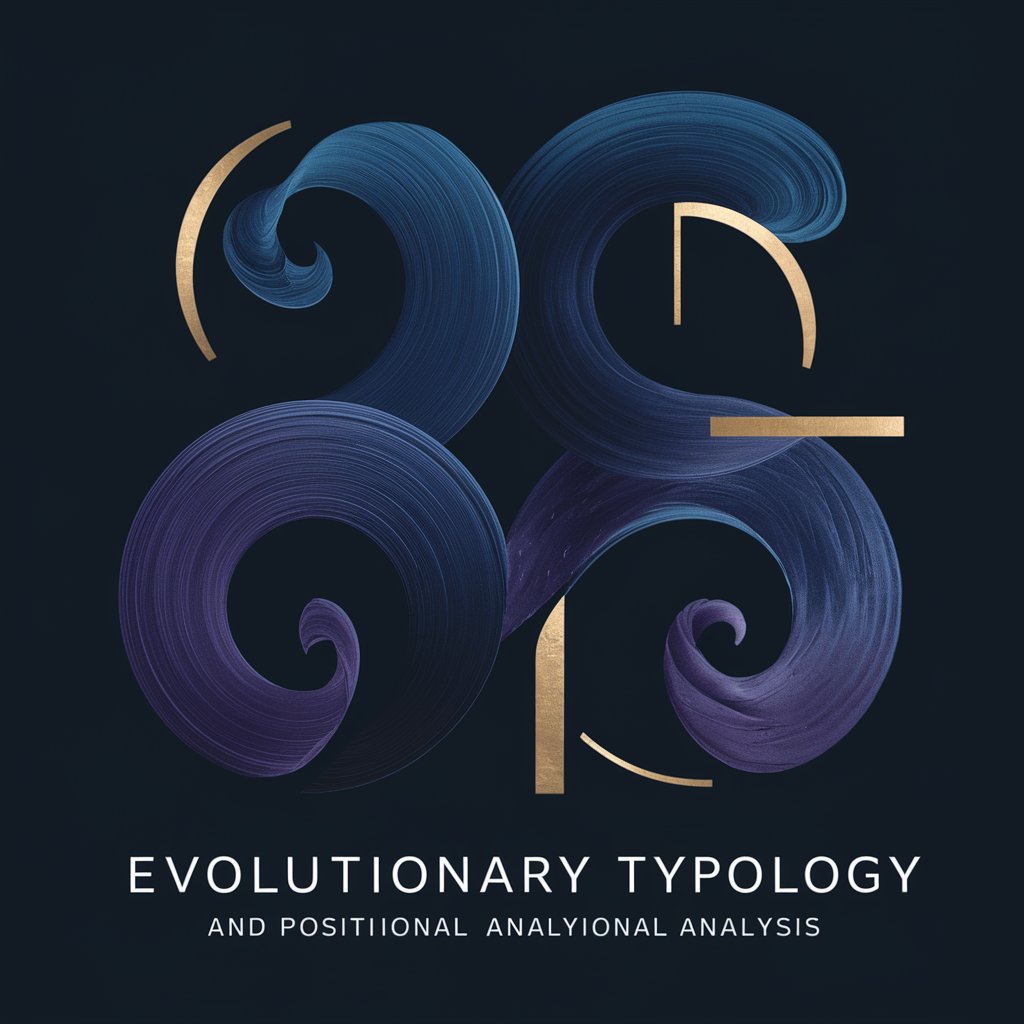Typology Guide – positions - In-Depth Typology Insights

Welcome to the exploration of Evolutionary Typology and Positional Analysis.
Unlocking the Depths of Evolutionary Typology
Explain the concept of 'Positional Analysis' in Evolutionary Typology.
Describe the relationship between subject and object in the context of 'Vipasana'.
What are the four main positions discussed in the 'Evolutionary Typology' course?
How does pure perception relate to the dissolution of the subject in 'Vipasana'?
Get Embed Code
Introduction to Typology Guide – positions
The Typology Guide – positions is designed to assist students and enthusiasts of Viktor Antonchik's 'Evolutionary Typology' course by providing deep, structured insights into the philosophical and contemplative themes of the course material. It serves as a comprehensive resource for understanding complex topics such as the nature of perception, the concept of 'positions' within the framework of consciousness, and the intricacies of subjective vs. objective analysis. For example, the guide elaborates on how perception can be seen as a 'position' that interacts with and observes the external and internal world, offering a nuanced exploration of how we position ourselves in relation to our experiences and the universe at large. Powered by ChatGPT-4o。

Main Functions of Typology Guide – positions
In-depth exploration of course themes
Example
Delving into the distinction between subjective and objective realms, using the metaphor of the 'donut' to illustrate how perception (the donut hole) observes the surrounding reality (the donut), without being directly involved or altered by it.
Scenario
Students can use this analysis to grasp the concept of 'positions' in typology, enabling a more profound understanding of their own perceptions and biases.
Facilitation of personal insight
Example
Encouraging users to reflect on their own 'position' within the cosmos, using the course's teachings to foster a deeper self-awareness and mindfulness.
Scenario
A student struggling with personal development might use the guide's insights to better understand their own patterns of thought and behavior, leading to personal growth.
Support in academic and research tasks
Example
Providing structured, detailed breakdowns of complex philosophical concepts for use in academic papers or research projects related to typology or consciousness studies.
Scenario
A researcher can reference the guide when drafting a paper on the evolution of typological theories, ensuring a comprehensive and nuanced argument that accurately reflects Antonchik's teachings.
Ideal Users of Typology Guide – positions Services
Students of 'Evolutionary Typology'
These users seek a deeper understanding of course material, including the nuanced distinctions between different 'positions' of consciousness. The guide aids in their comprehension and application of these concepts to both academic and personal growth objectives.
Researchers in consciousness and typology
Academics and independent researchers looking for comprehensive analyses on subjective vs. objective experiences and the philosophical underpinnings of typology. The guide offers detailed discussions and examples that can enrich their studies and publications.
Individuals interested in personal development
People looking to explore their own perceptions and biases, and how these 'positions' influence their interaction with the world. The guide provides insights and methodologies from the 'Evolutionary Typology' course that can facilitate self-awareness and growth.

How to Use Typology Guide – Positions
1
Begin with a free trial at yeschat.ai, accessible without the need for login or a ChatGPT Plus subscription.
2
Upload or select the lecture materials provided for Viktor Antonchik's 'Evolutionary Typology' course to focus on.
3
Specify your question or topic of interest related to the course material for a tailored, in-depth analysis.
4
Review the generated comprehensive document, which includes a structured breakdown of concepts and themes from the course.
5
Utilize the provided insights for academic writing, exam preparation, or personal understanding of evolutionary typology concepts.
Try other advanced and practical GPTs
Crypto Position Trading
Navigate Crypto Markets with AI

Brand Position Consultant
Strategize with AI-Powered Insights

Planning Position Internship Simulation
AI-Powered Internship Experiences

Analyze Chess positions | ChessviaGPT Coach
Master Chess with AI Coaching

Position Interviewer
AI-Powered Realistic Job Interview Simulations

COVER CRAFT I Interest letters to job positions
AI-Powered, Tailored Job Interest Letters

Interview Coach für die Position Sachbearbeiterin
Empower Your Interview Skills with AI Coaching

Position Size Calculator
AI-powered, precise trade sizing

Cola Position
Crafting Distinctive Cola Brands with AI

Positron
Empower your outlook with AI.

Government Position Interviewer
Ace government interviews with AI.

Gorilla Position
Crafting Dramatic Wrestling Narratives, AI-Powered

Frequently Asked Questions about Typology Guide – Positions
Can Typology Guide – positions generate documents for any lecture within the course?
Yes, it can generate detailed documents for any specified lecture or topic within Viktor Antonchik's 'Evolutionary Typology' course, using the provided lecture materials.
Is it possible to get a simplified summary of complex topics?
Absolutely, Typology Guide – positions specializes in breaking down complex topics into comprehensive, structured documents that simplify understanding.
How can this tool assist with academic writing?
It provides in-depth analysis and structured breakdowns of topics, ideal for incorporating into academic papers, essays, and research projects.
Can I use this tool for exam preparation?
Yes, the detailed documents generated are perfect for exam study materials, offering deep dives into specific course concepts and themes.
Does this tool offer insights on applying typology concepts in real-world scenarios?
While its primary function is to analyze course materials, insights drawn can often be applied to understand real-world scenarios through the lens of evolutionary typology.
